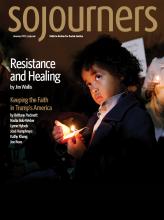Binary, Schminary
As a Caucasian who is passionate about race reconciliation, I was over-the-moon thrilled when I read the piece by Kathy Khang, “Opting Out of the Black-White Binary,” in the November 2016 issue. I have long advocated to move beyond the black-white binary, as it excludes so many others from entering the conversation or sharing their own struggles and experiences with racism. I can’t wait to share this with others or read the book she co-authored!
Shanna Seye
via email
New Life, Old Problems
The fact that only 20 percent of the members of Congress are women should be understood as evidence that women are not seen as intelligent and as capable of wise judgment as men (“Welcome to Post-Sexist America,” by Jim Rice, November 2016). Women possess intelligence and judgment because they are, like men, human persons.
A post-sexist America would reflect this truth in the make-up of our governing body. However, a post-sexist America would also be called upon to recognize and support women in the aspect of their humanity which men do not share—women’s ability to carry and give birth to new life. Yet in this matter America is woefully remiss. The United States ranks 61st in maternal health. The risk of maternal death is higher here than in any developed country. We rank 29th in infant mortality—behind Cuba. While seven babies out of 1,000 live births die by the age of 5 in America, only three babies out of 1,000 live births die in Singapore. Surely, these figures would change dramatically in a post-sexist America.
Tesse Hartigan Donnelly
Oak Park, Illinois
Why Not Pro-Love?
David Gushee’s article (“The Abortion Impasse,” November 2016) suggests that “reducing demand” for abortions is the only meaningful path forward for us. Perhaps we can expedite this as a people by reminding ourselves that the summum bonum, or “highest good,” as far as Christian ethics has been able to articulate it, is love. Not life. Not freedom. Love. The problem love recognizes is that to choose life or freedom sometimes means death to someone. Love maximizes both life and freedom and will also sacrifice both for love. We can only be “pro-choice” and “pro-life” by being “pro-love.”
Graham Hutchins
Port Angeles, Washington
God’s heart for justice
Thank you for having the courage to print Brandon Wrencher’s November 2016 “Living the Word.” I’m a 73-year-old white lady who didn’t begin to understand God’s heart for the poor, the oppressed, and justice until I was in my 40s. For about 20 years now, I’ve been sojourning mostly with black Christians, under black pastoral leadership, and studying a plethora of books by black authors. In the lives of my black friends I have seen the truths that Pastor Wrencher has brought to light. I’m praying that I can better articulate his concepts to my white brothers and sisters.
Carol Aucamp
St. Louis, Missouri
Clarification: The 1963 encyclical “Peace on Earth” was from Pope John XXIII, not from the Second Vatican Council as we stated in our December issue.
Read the Full Article

